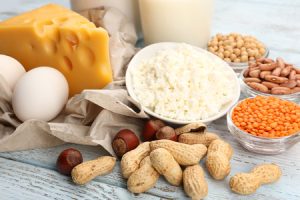Protein is often misperceived as the “hero” of the macronutrients. Following a high-protein diet has been marketed and practiced to ad nauseam. High protein diets have been and continue to be touted as the secret to shedding the pounds and shredding muscle – all in a short timeframe.
High protein diets can elicit fast initial weight loss, it’s not the kind of weight loss we want our clients to achieve (or carry on in perpetuity).
While protein is the most ubiquitous nutrient in the body, it is not necessarily a magic bullet. Nutritional magic only happens when food intake is harmonized with what the body needs. The human body performs based on how it is fueled and refueled. Protein is a key to striking that balance. It’s important to educate clients about the how’s and why’s of protein intake.
Fast Protein Facts
• Proteins are major structural components of muscle, brain tissue, blood, skin, nails, hair, and the nervous system
• Protein serves as a transport mechanism for vitamins, minerals, oxygen, and fats
• Protein is foundational to the body’s acid-base and fluid balance
• Proteins are built from amino acids
• The body makes the majority of amino acids, but there are 8 to 10 the body cannot produce (these are called essential amino acids)
• Proteins that contain all essential amino acids are termed “complete” whereas those that don’t are termed “incomplete”
• The body has a limited capacity to store protein
Why do we need protein?
The human body is in a constant state of recycling. The body breaks down material and builds it back up again. Proteins (along with other components) allow for the repair and regeneration of the body’s cells.
The More is Better Myth
This is where some popular fad diets take creative liberties with the science. Too much protein will be stored as either glucose (usable fuel) or fat (stored fuel). This means that an intake of protein in excess of what the body currently needs will result in stored energy – the same is true for carbohydrates and fats. In short, too much of any one macro-nutrient creates an imbalance and the body like’s balance.
Additional protein (beyond what the body needs at any given time) will not result in a leaner physique, shredded muscle, or a “bikini-ready” body. When teaching clients about protein intake, keep in mind that sometimes more is just that – more -and not better.
Keep it Relevant and Basic
Provide clients information that they can grab onto and immediately implement. If you have a client that is thirsty for the nerdy-science talk, that’s ok – bust out the peptide bond models. But most clients want to know the what (is protein), the why (my body needs it), and the how (can I make the most beneficial choice to support my body’s needs). Focus on those key factors and your clients will be protein pros in short order!
Educating about Proteins
 While being ever mindful of your scope of practice, here are some topics and tactics you can employ to boost your clients’ knowledge of this important building block.
While being ever mindful of your scope of practice, here are some topics and tactics you can employ to boost your clients’ knowledge of this important building block.
• Differences between the types of proteins (animal vs. plant, etc.)
• Combining plant-based proteins to boost essential amino acid intake
• Food sources of various proteins (this is where a grocery shopping tour or cooking demo is useful)
• The role of protein in the body
• Potential consequences of too much and too little protein intake
Examine the Following Scenario
Your client, Megan, submits her food log to you from the previous day. Here’s what it reflects.
Breakfast
1 cup Organic Spelt Flakes with skim milk
10 large strawberries
Soy Latte (8 oz)
Lunch
Greek salad (Kalamata olives, feta cheese, tomatoes) with oil and vinegar dressing (2 tbs)
Medium apple
Iced Tea
Dinner
Carrot-Ginger soup (2 cups)
Roasted sweet potato with butter
8 ounces of Chardonnay
Water
Snack
Granola bar
Rye crackers with sweetened almond butter
Brownie with one scoop of vanilla ice cream
Air-popped popcorn with salt and butter
What recommendations can you give Megan in order for her to strike a better protein balance?
Protein comes from many different sources and has a variety of purposes depending on the person consuming it. Keep your clients up to date on the latest research and the ins and outs of proteins so they can consume with clarity.
[info type=”facebook”]Join the Facebook Community Group to meet other trainers.[/info]
Dr. Erin Nitschke, NFPT-CPT, NSCA-CPT, ACE Health Coach, Fitness Nutrition Specialist, Therapeutic Exercise Specialist, and Pn1 is a health and human performance college professor, fitness blogger, mother, and passionate fitness professional. She has over 15 years of experience in the fitness industry and college instruction. Erin believes in the power of a holistic approach to healthy living. She loves encouraging her clients and students to develop body harmony by teaching focused skill development and lifestyle balance. Erin is also the Director of Educational Partnerships & Programs for the NFPT. Erin is an editorial author for ACE, IDEA, The Sheridan Press, and the Casper Star Tribune. Visit her personal blog at belivestaywell.com

